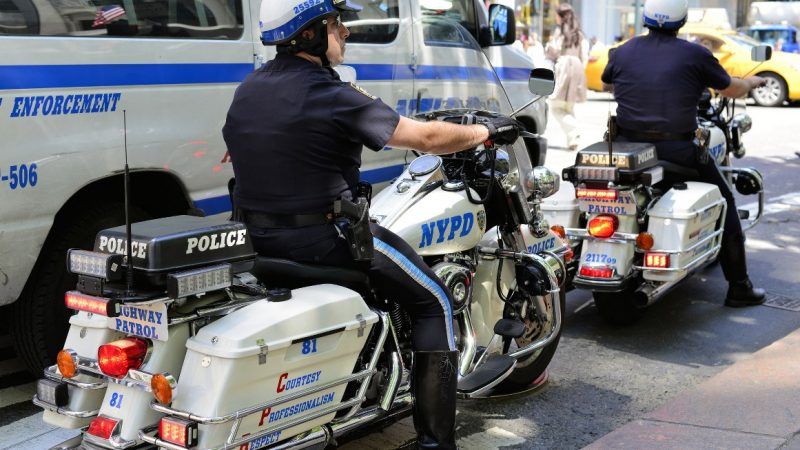New Yorkers Overwhelmingly Voted To Give a Civilian Oversight Board More Power To Investigate Lying Cops
Police unions are unhappy.

New York City police officers may face actual consequences for lying after voters passed a ballot question Tuesday to strengthen a civilian oversight board that reviews complaints of police misconduct.
New York City voters approved a ballot question by 74 percent that will give the city's Civilian Complaint Review Board (CCRB), an NYPD oversight group, the power to investigate and potentially prosecute NYPD officers for lying.
Ballot Question 2 will expand the number of CCRB members, increase its funding, and allow the board to investigate the truthfulness of statements made by NYPD officers during the course of its investigations.
The board can now also recommend discipline against police officers found to have lied and require the NYPD police commissioner to provide the CCRB with a written explanation when the commissioner departs from the board's recommendations.
"New Yorkers looked at the facts and voted for greater police accountability in their city," CCRB chair Fred Davie said in a statement following the vote. "This slate of reforms will make the CCRB more efficient, make discipline more transparent, and bolster public confidence in the integrity of the agency's process."
Watchdog reports and media investigations have revealed systemic problems with the disciplinary process guiding the roughly 35,000 sworn officers of the NYPD, the largest police department in the country. The process is cloaked in secrecy, and the NYPD commissioner has total discretion to ignore the disciplinary recommendations in administrative trials of officers.
Last year, BuzzFeed News obtained thousands of NYPD misconduct records through a leak. The resulting investigation identified 319 NYPD employees who had committed offenses serious enough to warrant firing—lying, stealing, ticket-fixing, excessive force—yet were allowed to keep their job.
Embarrassed by the leaks, the NYPD formed an independent panel to review its disciplinary process. The panel released its report earlier this year, finding that there is a "fundamental and pervasive lack of transparency into the [NYPD's] disciplinary process and about disciplinary outcomes."
Police unions, which have opposed efforts to roll back police secrecy laws and increase oversight of the department, urged voters to reject the ballot question.
The Police Benevolent Association (PBA), a powerful union of rank-and-file NYPD officers, said in a statement opposing the ballot question that "each unsubstantiated complaint can derail an officer's career, subjecting him or her to performance monitoring and hurting his or her chances of career advancement."
"An emboldened CCRB would exacerbate this situation, embolden anti-police extremists, and reduce the authority of the Police Commissioner," the PBA continued.
New York City Mayor Bill de Blasio, as is his habit on matters that anger police unions, dithered when asked directly about his stance on the ballot question. Meanwhile, his office was reportedly working behind the scenes to scuttle the initiative.
Tuesday's vote comes at the same time that district attorneys offices in New York City have begun releasing lists of police officers whose credibility, or lack thereof, has been flagged by prosecutors. These so-called "Brady lists," named after the Supreme Court precedent set in Brady v. Maryland, are used to keep disreputable cops off the witness stand and provide information on past misconduct to defense attorneys.
On Wednesday, the Brooklyn D.A.'s office publicly released a list of 54 NYPD officers with credibility issues, spurred by Freedom of Information requests from Gothamist and WNYC.
"Officer names, including those we are barred from releasing to the public, are regularly disclosed to defense lawyers and the courts in keeping with our legally-mandated obligations," Brooklyn D.A. Eric Gonzalez said Wednesday. "We have also publicly released the identities of police officers my Office has deemed not credible and that we would never use as the sole witness in a case."
Unsurprisingly, police unions also got lathered up about the release of the list.
"It is clear that Brooklyn D.A. Eric Gonzalez has abandoned his prosecutorial role. He sides with the criminals, not crime victims," PBA president Patrick Lynch said in a statement. "He knows that truthful police testimony gets thrown out every day in our courts, often based on a judge's whims and biases. He knows that publicizing this information will destroy the careers of honest police officers and torpedo the cases against violent, gun-toting criminals—assuming he bothers to prosecute them at all."
Among the NYPD officers on the list was Richard Danese, who was indicted for unlawful imprisonment and child endangerment for allegedly dumping a 14-year-old boy in a swamp as punishment for egging cars on Halloween in 2007. Danese eventually pled guilty to disorderly conduct and was allowed to keep his job.


Show Comments (42)